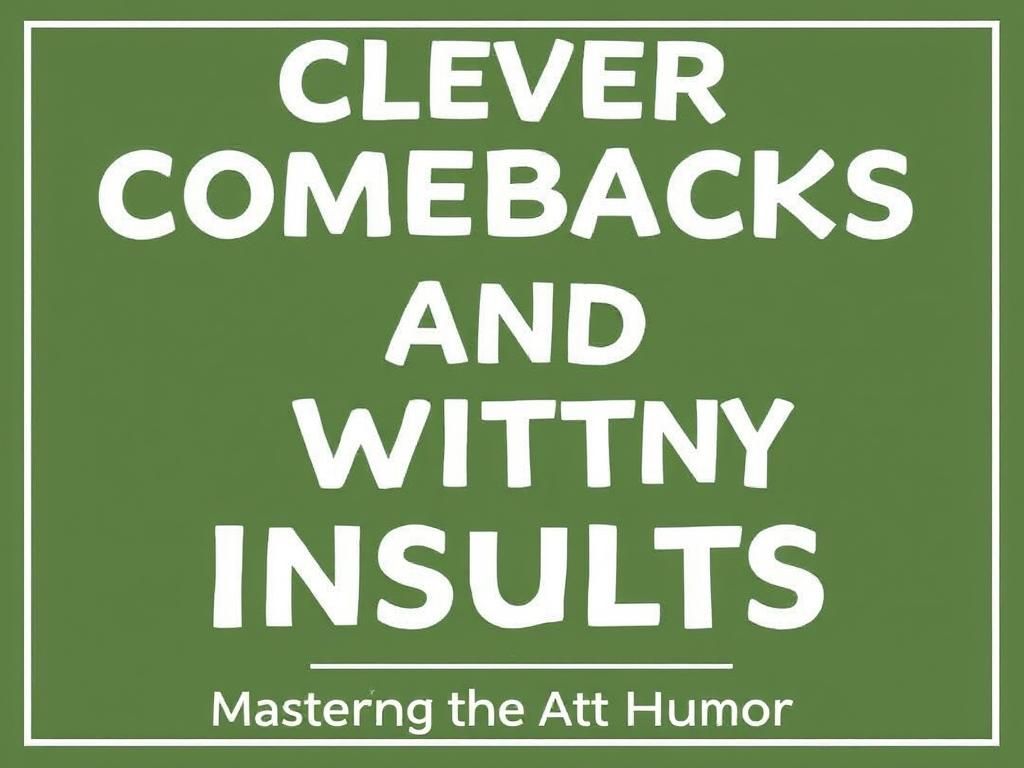The world of communication is often a dance of words, and in this intricate choreography, clever comebacks and witty insults play a crucial role. Defined as quick, clever responses that may be humorous or sarcastic, these expressions inhabit a unique space in the art of conversation. In an increasingly digital society where interactions are both rich and varied, understanding the nuances of wit can enhance our connections, allowing for playful banter while respecting boundaries.
Not only do clever comebacks diffuse tension in uncomfortable situations, but they can also serve as powerful social tools. Navigating through humor, people can shape perceptions and even dictate social dynamics. This article explores the intricacies of clever comebacks and witty insults, delving into their artistry, the psychological aspects behind them, practical tips, and ethical considerations. Whether for casual conversations or standing out in social settings, mastering these techniques can elevate your communication skills.
The Art of Clever Comebacks
Understanding Comebacks
At its core, a comeback is a sharp, witty remark intended to respond to an insult or challenge. They often come as a witty retort, allowing the speaker to regain or maintain their social footing. Clever comebacks serve multiple purposes: they can amuse, deflect criticism, or even turn the tables on the instigator. They shift the conversational dynamic and can assert confidence, making the speaker feel empowered in social situations.
Key Elements of a Great Comeback
To craft a great comeback, one must consider several key elements:
– **Timing and Delivery**: A well-timed comeback delivered with confidence is often more impactful than a scripted response. The art of timing requires acute awareness of the conversation’s flow.
– **Context and Appropriateness**: Knowing when to deploy a clever remark is crucial. A comeback may be hilarious in a casual setting but could fall flat or cause offense in a formal context.
– **Brevity and Punchiness**: The best comebacks are often short and to the point, packing a punch without lengthy exposition. Aim to be memorable while keeping it concise.
Examples of Clever Comebacks
Here are some situational examples of clever comebacks that can be effective in various contexts:
– During a heated argument, if someone says, “You’re just not getting it,” a clever reply might be, “And you’re just not trying.”
– At a social gathering, when someone jokes about your outfit choice, a witty retort could be, “Well, at least I’m not wearing last year’s trends!”
Incorporating famous quotes can also enhance your comeback arsenal. For instance, if someone drags you into a debate about politics, you could cheekily quote Oscar Wilde: “When the gods wish to punish us, they answer our prayers.”
Pop culture references also serve as excellent comebacks. Think of using a line from a well-known movie, like “Here’s looking at you, kid,” from *Casablanca* to redefine a conversation’s mood humorously.
Crafting Witty Insults
The Fine Line Between Humor and Offense
When delving into the territory of wit, it is crucial to recognize the thin line between humor and offense. Understanding your audience is paramount. What might be funny to one person could strike another as deeply hurtful. Before crafting a witty insult, consider the relationship you hold with those involved and be mindful of sensitive topics.
The timing of using humor is equally essential. It’s best to avoid witty insults during intense discussions or when emotions are running high, as the potential for misunderstanding increases dramatically. The consequences of insulting humor can affect relationships, so always factor in how your words may be received.
Types of Witty Insults
Witty insults can vary greatly in tone and impact. Some common categories include:
– **Light-hearted vs. Biting Insults**: Light-hearted insults are playful and meant for fun, such as saying, “You’re the reason God created the middle finger.” In contrast, biting insults may cut deeper, often leading to conflict.
– **Playful Banter vs. Hurtful Comments**: Playful banter keeps the mood light and fun, while hurtful comments can generate resentment or hostility. Being intentional about which type to use will affect the conversational atmosphere significantly.
– **Historical and Literary Insults**: Drawing from historical or literary examples can add depth to witty insults. For instance, Shakespeare’s use of language can still evoke laughter today: “Thou art as fat as butter.”
Techniques for Creating Witty Insults
Creating witty insults effectively hinges on employing a variety of techniques:

– **Wordplay and Puns**: Incorporate puns into your insults for a humorous twist. For example, “I can explain it to you, but I can’t understand it for you.”
– **Mimicry and Parody**: Mimicking someone’s speech or style can create a humorous effect without being directly offensive.
– **Sarcasm and Irony**: Both tools can deliver an insult wrapped in humor, edging on playfulness so that it doesn’t come off as mean-spirited.
Categories of Comebacks and Insults
Situational Comebacks
The effectiveness of a comeback can vary significantly depending on the situation. Here are some common scenarios:
– **Work-related Scenarios**: In a meeting where someone challenges your idea, replying with, “Great idea! Why didn’t I think of that? Oh right, I just did,” can bring a humorous twist to a tense moment.
– **Social Gatherings**: If someone mentions your single status at a party, a witty quip could be, “I’m not single; I’m in a long-term relationship with freedom.”
– **Family Dynamics**: In a family gathering, if a sibling teases you, a playful comeback like, “I love our family—of course, I’d love it even more from a distance!” can lighten the mood.
Pop Culture References
Utilizing pop culture references can enhance your comedic arsenal significantly. Consider these examples:
– **TV Shows and Movies**: Using iconic lines from shows like *The Office* can instantly resonate with fans. For example, “I am Beyoncé, always.”
– **Celebrity Quotes**: Celebrities often deliver memorable one-liners. Reflecting them in conversation can add flair.
– **Memes and Internet Culture**: Internet memes can provide a contextually relevant backdrop for modern comebacks, such as using a popular meme format to illustrate your point humorously.
Context-Based Insults
Certain contexts, like literature and history, offer rich ground for crafting insults. For instance, Shakespeare had the following memorable line: “Thou art as fat as butter.” Ancient insults can still bring laughs today, allowing for a nostalgic homage to clever wordplay. Similarly, historical political debates often yield iconic comebacks that resonate with audiences, emphasizing the ongoing relevance of wit in human interaction.
The Psychology Behind Wit and Insults
Social Dynamics and Power
Wit can often serve as a tool to establish dominance within a group. The psychological underpinning of humor and ridicule can shift the balance of power within social dynamics. Those adept at delivering clever comebacks or witty insults may navigate social situations more effectively, as humor can play a significant role in forming hierarchies among peers.
Furthermore, employing humor serves as a form of social bonding. Sharing a laugh or a clever exchange frequently cements friendships and establishes camaraderie.
Benefits of Using Wit
The benefits of harnessing humor in communication are extensive:
– **Easing Tension in Conflict**: Humor can serve as a powerful de-escalation technique, allowing individuals to address conflicts with lightness rather than hostility.
– **Enhancing Social Interactions**: Engaging humorously can foster connection and enhance overall communication effectiveness.
– **Boosting Confidence in Communication**: Entertaining comebacks and witty insults can bolster self-confidence, allowing individuals to engage more freely in conversations.

Practicing Witty Comebacks and Insults
Tips for Improving Your Wit
Improving your wit requires a blend of practice and observation:
– **Observational Skills and Active Listening**: Pay attention to the dynamics in conversations, noting when clever comebacks or witty insults elicit laughter.
– **Practicing with Friends or in Safe Environments**: Test out your clever comebacks with friends who appreciate humor. This can help you refine your responses without fear of backlash.
– **Keeping a Repository of Clever Lines**: Maintain a mental or written list of comebacks and insults to draw upon, improving your readiness for impromptu exchanges.
The Role of Improv and Comedy
Engaging in improv exercises can significantly boost your ability to deliver clever comebacks. Improv classes encourage spontaneity and adaptability, enabling participants to think on their feet. Famous comedians, like Robin Williams or Ellen DeGeneres, demonstrate the power of quick wit and humor in their performances, showing how expertly crafted responses can create memorable interactions.
Ethical Considerations
Knowing When Not to Use Insults
It’s essential to understand when not to employ witty remarks, particularly regarding sensitive topics. Being conscious of boundaries can prevent personal attacks that may hurt others. Additionally, the impact of chosen words can affect mental health, so employ your wit responsibly to ensure that humor uplifts rather than diminishes.
Moving Forward After an Insult
Should a witty insult cross the line, owning up to the situation is vital. Apologizing sincerely can mend relationships strained by unintended harm. Moreover, learning from experiences helps hone your approach to humor in the future.
Summary of Key Points
| Key Concepts | Details |
|---|---|
| Definition of Comebacks | Sharp, witty responses to insult or challenge |
| Key Elements | Timing, context, brevity |
| Types of Insults | Light-hearted, biting, playful banter |
| Benefits of Wit | Eases tension, enhances interactions, boosts confidence |
| Practicing Techniques | Observational skills, testing with friends, using improv |
Frequently Asked Questions
1. What is a clever comeback?
A clever comeback is a witty or humorous reply to a remark, often used to deflect criticism or assert dominance in a conversation.
2. How can I improve my comebacks?
You can improve your comebacks by practicing active listening, keeping a mental repository of witty lines, and participating in improv activities.
3. Are witty insults always offensive?
Witty insults can range from light-hearted to biting. It’s essential to understand your audience and context to ensure they’re taken humorously.
4. When should I avoid using humor?
Avoid using humor in sensitive situations or when emotions run high, as it could exacerbate conflicts or hurt feelings.
5. Can humor help in professional settings?
Yes, humor can ease tension and foster positive relationships in professional settings, as long as it’s used appropriately.
6. What are some historical examples of comebacks?
Historical figures have delivered memorable comebacks, such as Winston Churchill’s famous retorts during debates which showcased his quick wit.
7. Is there a difference between sarcasm and irony?
Both sarcasm and irony involve a contrast between expectations and reality. However, sarcasm specifically involves mocking, while irony can be subtler.
8. Can practicing comedy improve social skills?
Yes, engaging in comedy can enhance social interactions, boost confidence, and help develop quick thinking in conversations.
9. What role does observational humor play?
Observational humor draws on everyday experiences, allowing individuals to connect through shared scenarios and making for relatable, clever comebacks.
10. How can humor boost confidence?
Successfully delivering a witty remark can lead to positive feedback from others, thereby reinforcing one’s self-esteem and encouraging more confidence in social situations.
Additional Resources
For those interested in deepening their understanding of humor and wit, consider exploring books like “The Humor Code: A Global Search for What Makes Things Funny” by Peter McGraw and Joel Warner. You can also join online forums or groups dedicated to humor enthusiasts and consider attending local improv workshops to practice your skills in a supportive environment.
Exploring the realm of clever comebacks and witty insults opens doors to more engaging, playful, and impactful conversations. With a mindful approach and an appreciative audience, the joy of witty banter can transform social interactions for the better.
